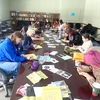“Shake the Habit” campaign to raise awareness of the need for better business solutions
Plastic bags are one of the most significant health and pollution threats in the world today, and the students, faculty and administrators at SUNY Fredonia have decided to do something about it.
They are asking all of the businesses in the Dunkirk-Fredonia region to go one day – Earth Day, April 22 – without using any plastic bags in their retail operations.
“The initial response has been tremendous, with dozens of area businesses already committing to the cause, including major retailers like Walmart, The Home Depot, J.C. Penney, Tops Markets, Subway Restaurants, Sherwin Williams, and Pizza Hut,” said Sherri Mason, a chemistry professor at SUNY Fredonia who came up with the idea.
The entirely voluntary initiative — believed to be the first of its kind in the U.S. — is designed to raise awareness of the numerous global problems which plastic bags cause. These include the needless death of close to one billion animals, birds and fish each year, as well as the serious, trickle-down health issues these non-degradable products can have on humans who ingest contaminated plants and animals, caused by the toxin polyethylene which plastic bags emit into soil and waterways, and ultimately becomes part of the food chain.
The campaign’s slogan, “Shake the Habit,” stems from the unmistakable sound emitted by a plastic bag as it is snapped opened with a flick of one’s wrists. Campus organizers felt the concept not only conjured up powerful imagery, but its visual and audible properties lent themselves nicely for promotional efforts.
Walmart general manager Brad Ballentine was the first major retailer in the region to join the cause, and is offering free reusable bags to its first 1,000 customers that day.
“Walmart has really stepped up its efforts in recent years, encouraging customers to recycle their electronics, conducting webinars to help suppliers become more environmentally conscious, and promoting reusable bags at check-out aisles,” Ballentine said. “Our store has partnered with SUNY Fredonia on several initiatives over the years, but perhaps none have had the long-term significance as this might.”
Kevin Gavin, the Dunkirk J.C. Penney store manager, agreed.
“Our parent company has focused on sustainability for years, and approximately 75 percent of total store waste is now recycled,” said Gavin, who added that the associates at his store will all wear green on April 22 to draw further awareness to the cause. “We reduced the Dunkirk store’s plastic bag consumption by 40 percent last year by offering our customers paper and canvas bag alternatives. This, along with several other innovative recycling programs we’ve initiated, led to our store being featured in the 2008 Earth Day edition of JLIFE, J.C. Penney’s internal employee magazine.”
“This campaign shines a light on a critical issue within our global ecosystem,” said Dr. Mason, who serves on SUNY Fredonia’s Sustainability Committee and is chair of its Earth Week campaign. “And, with hundreds of potential businesses involved — each serving hundreds, if not thousands, of customers each day — it’s clear that going even a single day without plastic bags has the power to make a meaningful, measurable change.”
 In fact, the university intends to measure that change, as each registered business participant will submit its average number of customers per day, which should go a long way toward estimating the number of bags the roughly 25,000-resident northern Chautauqua County community consumes in a given day. Indeed, just the handful of businesses that have signed up before the campaign’s official launch collectively serves in excess of 10,000 customers on a typical Thursday.
In fact, the university intends to measure that change, as each registered business participant will submit its average number of customers per day, which should go a long way toward estimating the number of bags the roughly 25,000-resident northern Chautauqua County community consumes in a given day. Indeed, just the handful of businesses that have signed up before the campaign’s official launch collectively serves in excess of 10,000 customers on a typical Thursday.“We understand that this won’t solve the problem overnight,” acknowledged SUNY Fredonia Vice President for Administration Tracy Bennett, who also serves as chair of the campus’ Sustainability Committee. “But it lets business and community leaders know that the current practices just aren’t good enough. We need to find a better way. In the long-run, it’s going to cost us much more to correct this problem if it reaches a tipping point.”
That tipping point is fast approaching and showing up in a variety of manners.
For example, in one day more than 25,000 plastic bags were collected along 300 miles of Atlantic Ocean shoreline in New York State alone, according to organizers of the 2009 International Coastal Clean-up effort. Many more bags wind up collecting in places they cannot be retrieved, and the damage they are causing is devastating.
“Animals often mistake them for food and choke to death,” Mason added, “or they see and smell the food that’s held within them, but get tangled or choke as they try to retrieve it.” currents — which accumulate large amounts of trash. One such gyre in the North Pacific has become known as the “North Pacific Garbage Patch” or the “Pacific Trash Vortex,” due to its abundance of plastic and other materials. Published reports estimate that it is larger than the size of Texas and contains over 100 million tons of debris, resulting in 46 times more plastic particles than plankton per unit volume.
In addition, rain and wind carry plastic bags into waterways, which eventually flow into oceans. Within each square mile of ocean, Mason stated, there are roughly 46,000 pieces of plastic. This debris is then carried into gyres — large systems of rotating ocean currents — which accumulate large amounts of trash. One such gyre in the North Pacific has become known as the “North Pacific Garbage Patch” or the “Pacific Trash Vortex,” due to its abundance of plastic and other materials. Published reports estimate that it is larger than the size of Texas and contains over 100 million tons of debris, resulting in 46 times more plastic particles than plankton per unit volume.
Tops Markets, the region’s largest grocery retailer, is backing the cause in multiple ways. Not only will the store eliminate the paper-or-plastic question that day, manager Mary Pauszek says her employees are collaborating with students in local elementary schools, staffing in-store information tables with “reduce, reuse and recycle” tips, and offering Tops’ branded reusable bags at a discount.
“Our customers usually require multiple bags on any given trip, but we recognize that reusable bags are a much better alternative,” says Pauszek. “We hope this will spark customers who haven’t invested in reusable bags to make the commitment this Earth Day.”
“I am very proud of the efforts our students, faculty and staff are taking in this matter,” said SUNY Fredonia President Dennis Hefner. “I can’t think of many other issues as important to our own sustainability or more worthy of our educational instruction. This is a remarkable opportunity to give our students real-world training in the most literal of terms.”
In fact, SUNY Fredonia has used this event as a teaching and experiential opportunity across a variety of disciplines. Its public relations majors, through their chapter of the Public Relations Student Society of America (PRSSA), have led the grassroots outreach with area businesses. Its student-run TV and radio stations, WNYF and Fredonia Radio Systems, are creating PSAs (public service announcements) to help promote the event. Science students will be stationed at various retailers to lend a hand and explain the reasons for the event, as well as the need for change. Even a co-ed a cappella group, Premium Blend, is getting into the act, arranging an environmentally themed song set for an on-campus performance that day.
“It’s a wonderful example of a growing change we’ve implemented across our campus,” Dr. Hefner added. “We’re always looking to leverage learning opportunities and collaborate across disciplines. That’s how the real world works today.”
In addition to leading this initiative and ensuring that all SUNY Fredonia retail operations are 100 percent plastic-bag free that day, the campus will commemorate the 40th anniversary of Earth Day with a keynote presentation by Lois Gibbs, who gained national notoriety in the 1970s after discovering her seven-year-old son’s school had been built upon a toxic waste dump. She went on to become the leader of the grassroots efforts which resulted in the exposure of the Niagara Falls Love Canal neighborhood and its ultimate evacuation and remediation.



